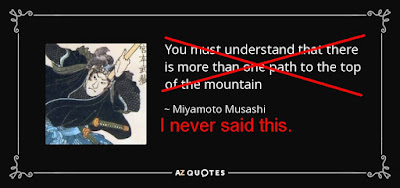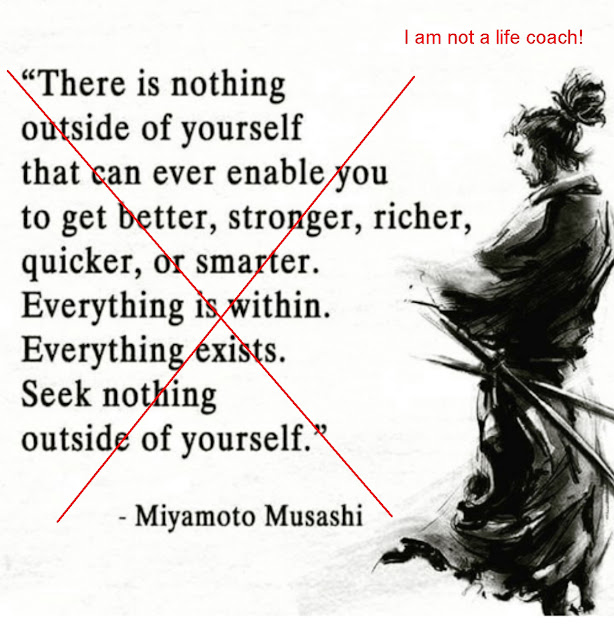Did Miyamoto Musashi Say "There is more than one path to the top of the mountain."?
Did Miyamoto Musashi Say "There is more than one path to the top of the mountain."?
Introduction
I came across this quote in one of my martial arts Facebook groups. I am completing a survey of books by and about Miyamoto Musashi (1582-1645), and I did not recall reading this phrase. The sentiment also appeared to be completely opposite to what Musashi thought, as he is very direct and precise about how to live. I decided to research this quote.
The Source
 |
| The Martial Artist's Book of Five Rings, 1994 |
The source of this saying is easy enough to find. It appears in the book first published by Tuttle in 1994 as The Martial Artist's Book of Five Rings, by Steve Kaufman. The subtitle says "The definitive interpretation of Miyamoto Musashi's classic book of strategy."
Since 2004, Tuttle has sold it as Musashi's Book of Five Rings.
I already described why this book has nothing to do with what Miyamoto Musashi actually said. Please see my post Did Miyamoto Musashi Say Something Like "There is nothing outside of yourself..."? for details.
Real Translations
This quote does not appear in any form in any of the reputable English translations (Harris, Cleary, Wilson, Tokitsu/Kohn, Bennett).
To give you a feel of how Musashi thought, here is a translation of the last document he ever wrote. He completed it several days before his death in 1645.
This translation is from Tokitsu/Kohn in their 2004 book Miyamoto Musashi: His Life and Writings, which is probably the most thorough study of Musashi's writings available.
“THE WAY TO BE FOLLOWED ALONE” (Dokkodo)
1. Do not go against the way of the human world that is perpetuated from generation to generation.
2. Do not seek pleasure for its own sake.
3. Do not, in any circumstance, depend upon a partial feeling.
4. Think lightly of yourself and think deeply of the world.
5. Be detached from desire your whole life long.
6. Do not regret what you have done.
7. Never be jealous of others, either in good or in evil.
8. Never let yourself be saddened by a separation.
9. Resentment and complaint are appropriate neither for yourself nor for others.
10. Do not let yourself be guided by the feeling of love.
11. In all things, do not have any preferences.
12. Do not have any particular desire regarding your private domicile.
13. Do not pursue the taste of good food.
14. Do not possess ancient objects intended to be preserved for the future.
15. Do not act following customary beliefs.
16. Do not seek especially either to collect or to practice arms beyond what is useful.
17. Do not shun death in the way.
18. Do not seek to possess either goods or fiefs for your old age.
19. Respect Buddha and the gods without counting on their help.
20. You can abandon your own body, but you must hold on to your honor.
21. Never stray from the way of strategy.
After reading this, I do not get the sense that Musashi was a "there is more than one path to the top of the mountain" sort of thinker.
Incidentally, following this straightforward translation, the authors decode the Japanese "word-by-word" to get a better understanding of what it means.
Conclusion
Stay tuned for my upcoming post on Musashi translations and analysis!
If you like this article, check out our Facebook page, Instagram account, Twitter feed, and Amazon Wish List. Be devoted!





Having read a few of these translations, including Kaufman's, I cannot disagree with what you have said.
ReplyDeleteKaufman seems to have taken some liberties with his translation but, given Kaufman's goal of writing it for martial artists and the contextual nature of the Japanese language, it seems understandable.
I understand your frustration; I see it when I see leadership textbooks using quotes from Jon Heider's The Tao of Leadership and attributing them to Lao Tzu or every time “Strategy without tactics is the slowest route to victory. Tactics without strategy is the noise before defeat” gets attributed to Sun Tzu in almost every Strategy textbook I see. But, while Lao Tzu or Sun Tzu might have agreed with the quotes ascribed to them, you feel that Mushashi's views are not in harmony with the quote attributed to him. Again, I cannot say you are incorrect; however, when I read The Five Rings, I had a different take.
I will be the first to admit that my understanding was not entirely based on his book as I was reading a biography about him, as well as the Mushashi serialized novel at about the same time. Having said this, I felt that the context was crucial. His single-mindedness when it came to the proper way a swordsman should conduct himself obviously comes through but, to me, it seemed clear that there were multiple paths to the way. It seemed to me that he felt his work in sculpting and other artistic endeavors were alternative paths and that, pursuing them, increased his understanding of swordsmanship. Perhaps the phrase "supporting path" might be more appropriate. I don't think he would have given up the sword but as we improve in one area, it enhances others. A "high-tide lifts all boats" sort of idea. I have seen something similar in my own career shifting from a practicing attorney to a management professor having to teach several non-law-related courses. The non-law courses helped me gain a deeper understanding of the tenets of law as I saw the commonalities more clearly.
How it would have improved him, I don't know as I am not an accomplished swordsman or sculptor. Perhaps waiting for the pu of the block of wood to reveal itself to the sculptor builds patience for watching combat situations unfold or something like that. I do feel he would not have spent very much time on something that was without purpose or application, so I have to believe that he thought it improved his swordsmanship or moved him closer to the enlightenment he sought.